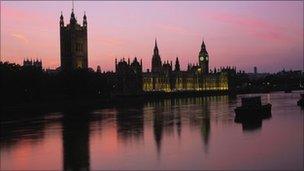Answer sought to the West Lothian question
- Published
- comments

The commission's focus will be on who votes on England-only bills in the Commons
The UK government has announced it has set up a commission to look into the so-called West Lothian question.
There has been a long-running debate about whether Scottish, Northern Irish and Welsh MPs should be allowed to vote on legislation that affects only England.
English MPs are not able to vote on many matters which are now devolved to other UK parliaments.
Commission members would be "independent, non-partisan experts".
An attempt to solve the problem was part of the coalition agreement, but it has taken the UK government more than a year to announce details of the promised commission into what is a long-running political sore.
A Written Ministerial Statement (WMS) was made in the Commons regarding the matter.
The statement said: "The government is clear that the commission's primary task should be to examine how this house, and parliament as a whole, can deal most effectively with business that affects England wholly or primarily, when at the same time similar matters in some or all of Scotland, Wales and Northern Ireland are lawfully and democratically the responsibility of the separate parliament or assemblies."
It also said that;
the commission would not examine financing, which is being dealt with separately
it would not look at the number of MPs
composition will be from a small group of independent, non-partisan experts with constitutional, legal and parliamentary expertise
the Speaker will be consulted and political parties will feed into the process
a fuller remit will be made public in October
The question was first posed when the Labour government tried unsuccessfully to introduce devolution in Scotland in the 1970s.
Labour MP Tam Dalyell, whose constituency at the time was West Lothian, wondered how long English MPs would tolerate members from Scotland, Wales and Northern Ireland exercising an important effect on English politics while they themselves had no say in the matters outside England.
Since the devolution of powers to the Scottish Parliament in 1999, and to the Northern Irish and Welsh assemblies, the West Lothian question has frequently returned to the fore.
The Conservative-Lib Dem coalition government's outline of the broad remit of the commission on the issue coincides with a private member's bill which is due to pass its final Commons hurdle this week.
Welsh Secretary Cheryl Gillan said in March that a commission examining whether MPs should be stopped from having a say on issues which do not affect their constituents would be appointed later this year.
Ministers would prefer Conservative backbencher Harriett Baldwin's Legislation (Territorial Extent) Bill 2010-11, external to be withdrawn and the commission left to do its work.
Ms Baldwin said of her bill: "This simple piece of legislation will clarify the impact of every bill passing through parliament and it is a small step on the way towards solving the so-called West Lothian Question.
"I am a passionate unionist but I feel this is an issue that needs resolving before the next election.
"We can't have a situation where a future government relies on a majority of Scottish, Welsh and Northern Irish votes to change controversial legislation like tuition fees for England.
"Although the Coalition Agreement calls for the establishment of the West Lothian commission, it has taken my bill to get movement on this."
If successful, her bill would require all bills put before the Westminster parliament to contain a clear statement of how they affect each of England, Scotland, Wales and Northern Ireland - including knock-on financial implications.
'Partisan interests'
She hoped that this would allow it to become accepted practice that Scottish, Welsh and Northern Irish MPs would not vote on England-only bills.
Labour's Shadow Lord Chancellor, Sadiq Khan, said it was important that the commission focussed on the best interests "of our nation's constitution".
He added: "The government's changes to the constitution have to date been characterised by narrow, selfish, partisan interests about the survival of the coalition.
"Therefore, I hope that on this issue the government will seek to work with all the major parties on the membership and the terms of reference for the commission."